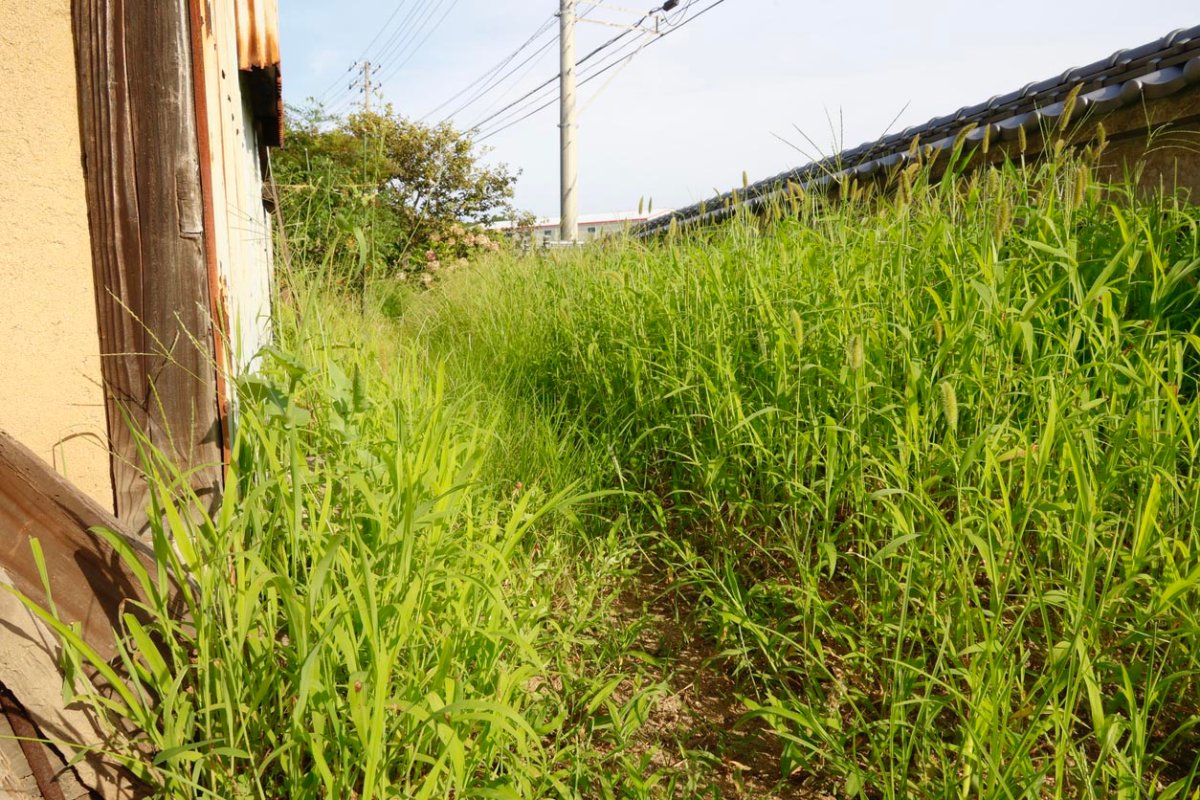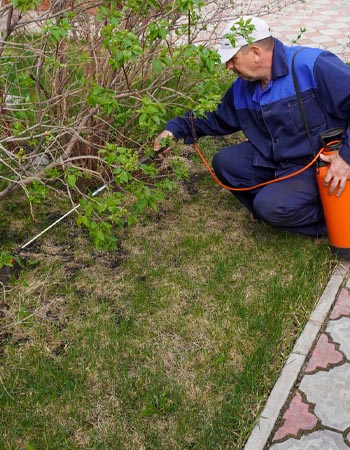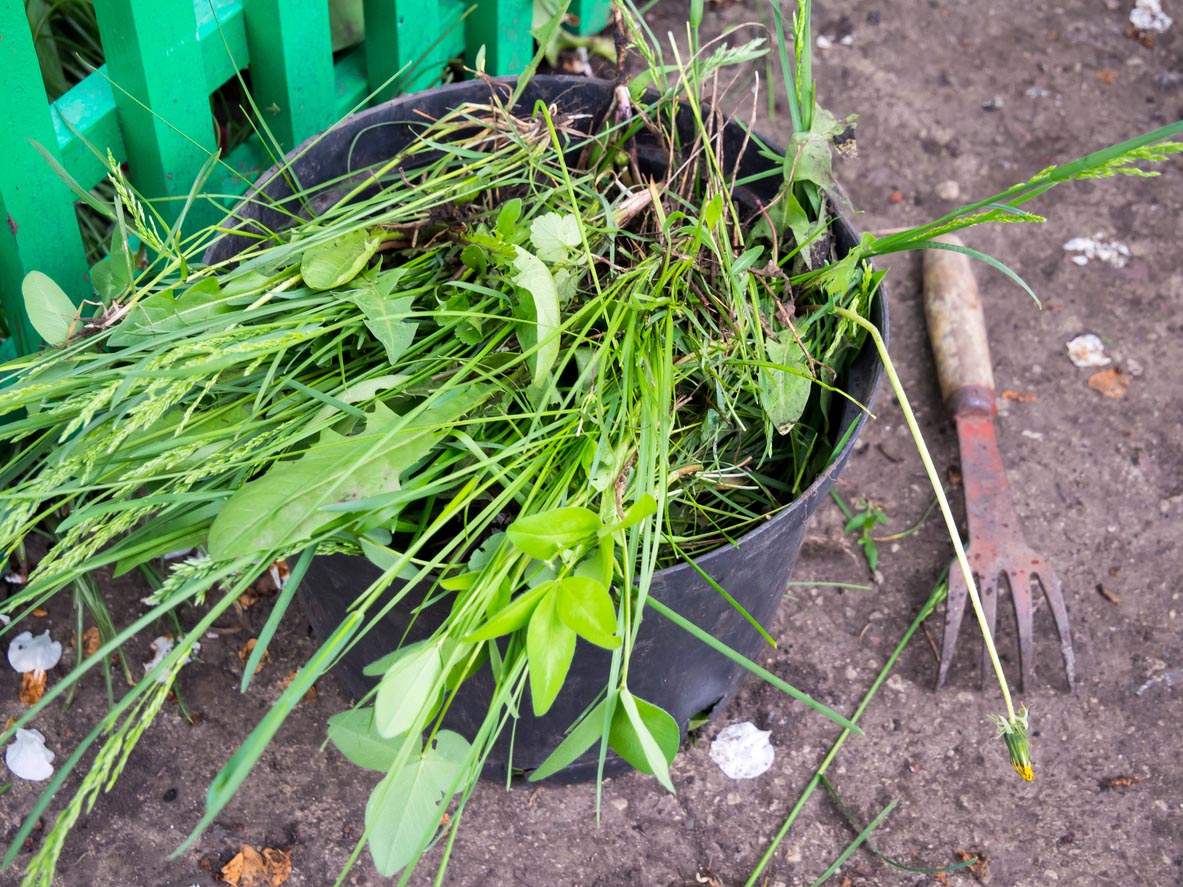

We may earn revenue from the products available on this page and participate in affiliate programs. Learn More ›
What You Need to Know
- A neighbor’s weeds are unsightly and can spread to your own lawn along with pests, debris, and lawn disease pathogens.
- If your neighbor’s weeds are bothering you or spreading to your lawn, the best options are to approach the neighbor and attempt to resolve the issue, or to fortify your own lawn against the spread of weeds (or both).
- When approaching your neighbor, it’s important to broach the issue gently, provide solutions that benefit both parties, and try not to force the issue if they’re not receptive.
- Some potential protective measures for defending against weeds include using natural herbicides, putting in landscaping rocks or mulch, installing a fence, or strengthening the lawn’s overall health.
Q: My next-door neighbor’s backyard is completely overgrown with weeds. Not only are the weeds ugly, but I’m concerned about them spreading to my lawn. Should I approach my neighbor about the problem? How can I proceed without damaging the relationship?
A: When you spend time and money keeping your yard pristine, it’s frustrating that a neighbor’s apparent lack of care for their own lawn can negatively affect yours. If their weeds have truly begun to spread to your yard, it’s perfectly appropriate to discuss this with them. However, it’s important to keep in mind that your neighbor may have personal reasons for leaving their lawn in its current state, whether it be a preference for a pollinator-friendly garden or life circumstances that are preventing them from devoting attention to lawn care. You may be able to work out a solution with your neighbor that works for both of you. But if not, there are a few practical strategies for keeping your own lawn free of weeds that can help mitigate the issue.
When a Neighbor’s Weeds Really Become a Problem

An overgrown lawn may be unsightly to some, but others may prefer a slightly wild and natural-looking backyard. In most cases, this is a matter of preference, and homeowners can style their lawns as they choose. However, when a lawn becomes too overgrown, it can begin to affect the surrounding properties.
Phil Catron is the president and founder of NaturaLawn of America, an organic lawn care company with locations across the U.S. He says, “Your neighbor’s unkempt lawn can potentially affect your lawn. If weeds next door are allowed to go to seed, these weeds can easily spread to your lawn. Unkempt lawns can harbor pests like fleas, ticks, and rodents [that can] end up entering your lawn area. If your neighbor’s lawn has disease pathogens, they can spread to your lawn via wind, water runoff, or mowing debris [and cause] damage to your grass and plants.”
Eventually, neighboring weeds could start to have a financial impact. Not only could you find yourself paying the cost of pest control or lawn care, but Catron notes that these weeds could also “detract from the overall appearance of your neighborhood, potentially affecting property values.”
How to Talk to Your Neighbor About Their Weeds, According to an Etiquette Expert
Jules Hirst is an etiquette and lifestyle coach and the founder of Etiquette Consulting in Culver City, California. She notes, “Addressing a neighbor about an overgrown lawn can be a delicate issue, as it treads the line between community standards and personal choice.” Fortunately, there are a few ways to approach the conversation in a way that will reduce the likelihood of conflict.
Consider whether the situation warrants a conversation.
While it may not be pleasant to look at an unkempt lawn next door while spending time in your own outdoor space, there are situations where it’s best to accept that you can only control your own property. According to Hirst, “Unless the overgrown lawn poses a safety risk or violates local ordinances, it’s best to leave the matter be, maintaining neighborly relations over aesthetic concerns.” However, that doesn’t mean that it’s never appropriate to have this conversation. “When the weeds start spreading into your own yard, you are more directly impacted and [this] requires a slightly different approach,” says Hirst. It’s especially important to say something if the issue is affecting you financially. For example, if rodents from next door are entering your yard, you may need to hire one of the best pest control companies (like Orkin or Terminix) to remove them. Costs for additional herbicide application can also add up, not to mention the demands on your time.
Approach the conversation delicately.
It’s important to have empathy when discussing something as personal as the state of someone else’s property. It isn’t always the case that the homeowner next door is simply too lazy to keep up with lawn maintenance. Hirst agrees. “You must approach them as a concerned neighbor checking in on another neighbor to make sure they are OK. Your neighbor may be having challenges, whether health, financial, or other, that are causing their lawn to be in disarray.” One way to frame the conversation is to express concern that they are violating community guidelines that could get them in trouble with the homeowners association (HOA). Even if it does turn out that the state of the lawn is the result of carelessness, your neighbor may be more willing to cooperate if they understand that you are coming from a place of concern and aren’t accusing them of neglect.
Come prepared with mutually beneficial solutions.
In order for a conversation with the neighbor to go as smoothly as possible, it’s a good idea to have some suggestions for resolving the issue. Ideally, these solutions will benefit both parties. “You can offer to set up a time to work on resolving the weed issue together,” Hirst says. “You can offer to share your tools and resources so the neighbor can solve the issue without them incurring too much cost. If neither party has the ability or time to resolve the issue, splitting the cost of a professional lawn care service can be an equitable solution.” You may even be willing to pay the cost of lawn care, although it’s important to be sensitive when offering this. Hirst says, “If the neighbor is in a financial crunch, then the offer of paying for the service is a nice goodwill gesture, but try not to offend the neighbor or embarrass them.”
Don’t force the issue.
While there’s a good chance your neighbor will be willing to work with you on the weed problem, it’s important to prepare for the possibility that they will not be. In this case, it will be necessary to accept their final decision without forcing the issue. “Unfortunately, you have to respect their decision and resolve the issue yourself. Whether that is by focusing on preventing the spread of weeds into your yard or by installing a physical barrier, the choice is yours,” says Hirst.
In the event that the problem is severe and poses a risk of pest infestation, it could be worth appealing to an authority for assistance. Hirst suggests, “If your community has specific yard guidelines, you can approach the community leaders for advice or assistance in resolving the situation. This should always be a last resort, as it can significantly strain neighbor relations. By focusing on what is within your control and maintaining a neighborly demeanor, you can resolve the situation without ongoing conflict.”

4 Ways to Defend Your Lawn Against a Neighbor’s Weeds
According to Catron, “Even though weeds may spread into your lawn from neighboring properties, there still is value in caring for your lawn to minimize weed infestations.” Whether your neighbor is willing to cooperate or not, keeping your own lawn well maintained can help prevent pest infestation, preserve your property value, and make the yard an enjoyable place to spend time.
1. Applying natural weed repellents like vinegar or corn gluten meal may stop most of the weeds in their tracks.
Many homeowners reach for herbicides when battling weeds. Commercial herbicides are often effective but may contain harsh chemicals that some homeowners prefer not to use. Catron recommends using corn gluten meal as a nontoxic alternative. “This natural pre-emergent herbicide suppresses weed seed germination by inhibiting root development. It’s best applied in early spring before weeds have a chance to sprout,” he explains.
It’s also been shown that vinegar kills weeds that have already sprouted, but it’s best used sparingly as it can damage grass or nearby plants in addition to weeds. It may also need to be applied repeatedly to be effective. Catron adds, “Some organic weed controls are available on the market and use natural ingredients like clove oil, citric acid, salts, or soap-based solutions to kill weeds without using synthetic pesticides.”
2. Putting down rocks or mulch along the property line can also prevent weeds from taking root in the yard.
The ideal environment for weeds to spread is bare, soft soil where plants can easily throw down their roots. Mulch or landscaping rocks placed between the neighbor’s yard and your own can act as a barrier for weeds. Since weeds will have a harder time taking hold in these conditions, it may slow their spread into the yard. Landscaping fabric can act as additional protection—even if weeds start to sprout in the mulch, they won’t be able to take root in the soil. However, it’s worth noting that airborne seeds are not likely to be deterred by these features. “The biggest issues are with dandelions, which are aerial invaders,” says Craig Elworthy, founder of the lawn care subscription service Lawnbright. “Their seeds are carried by the wind and will blow into your yard no matter how diligent your own lawn care routine is.” A professional from one of the best landscaping companies may have additional suggestions for features that keep weeds from crossing over the property line.
3. Installing a fence may slow the spread of weeds and pests from neighboring properties.
In some cases, a solid fence that sits close to the ground can act as another guard against weeds from neighboring properties. It can also block seeds from blowing into the yard and taking root. While a fence is not likely to solve the weed problem on its own, it may be useful when implemented with other strategies. According to Elworthy, “A fence will help somewhat, but it’s an extremely expensive way to deal with neighboring weeds, so don’t install a fence for the sole purpose of preventing weeds from a neighbor’s property.” To that point, fence installation costs can range from $1,743 to $4,431, which is not insignificant. But if it’s within the budget, a solid privacy fence can block the unsightly yard from view in addition to providing a barrier for weeds. Talking to a fence installation professional can help you decide if this is a project worth paying for.
4. Strengthening your lawn’s overall health can make it less susceptible to infiltration from weeds.
As Elworthy puts it, “This is a case where the best defense is a good offense: Having a thick stand of turf acts to crowd out weeds all on its own. You should follow a lawn care routine [that] involves mowing, watering, and fertilizing. This is not only the most cost-effective option, but it will also prevent the majority of the [neighbor’s] weeds from invading your yard.” It may be worth reaching out to one of the best lawn care companies (some top choices are TruGreen or Lawn Love) for support if you don’t have hours to devote to applying fertilizer or overseeding. Alternatively, trying one of the best DIY lawn care programs and subscriptions like Sunday can help you boost the health of your lawn.

DIY Lawn Care. Simplified.
Bob Vila has partnered with Sunday to get your lawn exactly what it needs to thrive. Free Lawn AnalysisWhether you choose to approach the neighbor about the issue, roll up your sleeves to take care of the weeds yourself, or both, taking action can make weeds from the neighbor’s yard less of a stressor. Elworthy has experienced this issue himself and has some encouraging advice.
“A few years ago my neighbor had a lawn full of weeds. I offered to spray their weeds on part of their yard which bordered my lawn and he was receptive to the idea. It opened up a conversation about lawn care, and I was able to share some insights with him about how to maintain a healthy lawn. By gently approaching the issue, I was able to solve the problem by [unraveling] his lawn knowledge. So if you plan to discuss it, proceed with caution, offer to take on some of the work, and approach it gently. The point is to be neighborly!”
